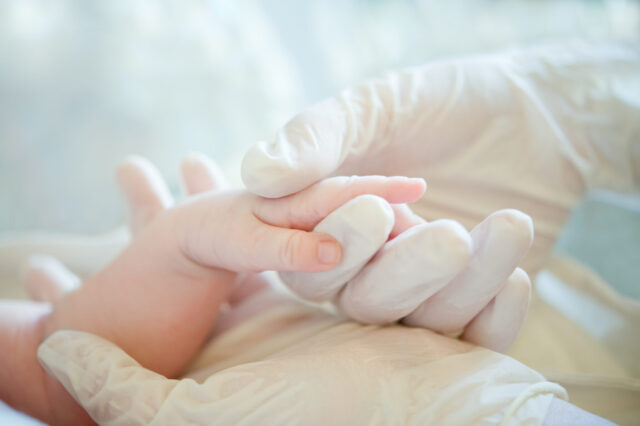The Case Against Mother And Infant Separation Amid COVID19 Pandemic
With so much still unknown about how the novel coronavirus spreads from person to person, many establishments have begun exercising extreme caution and practicing strict social distancing in an attempt to reduce the risk of transmission. Although proceeding with caution is well-warranted, some recent recommendations being implemented in hospitals across America in regards to separating mothers from their newborn babies, have both parents and medical professionals asking, where do we draw the line?
The CDC, the leading public health institute in America, recently began supporting and endorsing the separation of babies from their COVID19+ mothers to reduce the risk of transmission and improve infant health outcomes. According to the CDC guidelines, this separation could last anywhere from 72 hours to two weeks, depending on the mother’s symptoms and speed of recovery.
Although separating mothers who are confirmed to or suspected to have an active COVID19 infection may seem reasonable at face value, once you start looking into the science outlining the risks of temporary separation, it becomes clear that this might not be the best course of action after all.
On April 9th, 2020, Obstetrician, Professor of Maternal-Fetal Medicine and Medical Director of Lactation Services at UNC Healthcare, Alison Stuebe, published an E-journal titled “Breastfeeding Medicine” that details all the risks and benefits associated with the short-term separation of mother and child.
The benefits of temporary separation seem to start and end with one potentially positive outcome: possibly avoiding infant exposure. On the contrary, the list of potential detriments is much more extensive and can cause long-lasting health consequences that may supersede the risks associated with coronavirus infection. The following points have been taken directly from Stuebe’s excerpts and can be found here.
The Arguments Against Mother And Infant Separation Amidst The Coronavirus Pandemic:
“1. Separation may not prevent infection. A study published in late March reported that 3 of 33 infants born in Wuhan, China, to mothers with COVID-19 tested positive for SARS-CoV-2; the infants were born by cesarean and managed with strict isolation precautions.3 Even if separation prevents infection during the maternity stay, it does not address exposure after the infant is discharged. Especially in the context of social distancing and travel restrictions, few families have the resources to isolate the infant at home, and it is highly plausible that other household members may be infected. Hospital isolation may, therefore delay, but not prevent, infant infection.
2. Interruption of skin-to-skin care disrupts newborn physiology. Infants who are separated from their mothers have higher heart rates and respiratory rates and lower glucose levels than infants who are skin-to-skin.4 This holds true even for infants who are placed in incubators. In a randomized controlled trial for 1200- to 2199-gram newborns, among infants who were skin-to-skin, 17% of infants experienced instability, based on objective parameters, compared to 92% of the infants in conventional incubators.5 In a subsequent study among term infants placed skin-to-skin versus alone in a crib, separation increased stress activity by 176%.6 As noted by the Royal College of Obstetricians and Gynecologists, “routine precautionary separation of a mother and a healthy baby should not be undertaken lightly, given the potential detrimental effects on feeding and bonding.” 7 Isolation is a significant stressor for newborn infants; for those infants already infected with SARS-CoV-2, isolation could worsen the disease course.
3. Separation stresses mothers. When mothers held their preterm infants skin-to-skin in the neonatal intensive care unit, their heart rate, salivary cortisol level, and stress scores decreased.8 Separating mothers from their infants, especially in the context of being diagnosed with a pandemic disease, has the potential to cause significant suffering, and the associated physiologic stress could worsen the mother’s disease course.
4. Separation interferes with provision of maternal milk to the infant, disrupting innate and specific immune protection. Breastfeeding is a baby’s first vaccine, and skin-to-skin care is important for colonization of the infant microbiome. Antibodies specific to maternal antigen exposure begin to appear in milk within 7 days,9 protecting the infant from infection. Furthermore, human milk contains multiple oligosaccharides and innate immune factors that mitigate the impact of viral infections.
5. Early separation disrupts breastfeeding, and not breastfeeding increases the risk of infant hospitalization for pneumonia. Early separation decreases breastfeeding duration compared to keeping mothers and infants together. And when infants are not breastfed, they have 3.6 times the risk of being hospitalized for pneumonia compared to infants who are exclusively breastfed for ≥4 months.10 Separating mother and baby immediately after birth may make the infant more vulnerable to severe respiratory infections, including COVID-19, in the first year of life.
6. Separate isolation doubles the burden on the health system. Separately isolating mother and infant requires twice the resources: two hospital rooms, two provider teams, and two sets of personal protective equipment (PPE) each time a provider enters or leaves the room. In the context of hospital overcrowding and dangerous shortages of PPE, this is deeply problematic.”
According to Stuebe, as of now, we currently have no evidence to support the action of early separation or proof that it improves infant health outcomes. Furthermore, the practice of separating mother and child goes against the World Health Organization’s guidelines, which dismisses the need to separate infected mothers from their infants and urges medical professionals to continue to encourage breastfeeding regardless of the mother’s COVID19 status.


I am 38 weeks pregnant. Covid positive with no symptoms for 20 days.
@jennifer maybe you should contact your hospital in advance to see what kind of policies they have in place.
We wish you all the best mama! The WHO still recommends that COVID19+ mothers breastfeed and remain in close contact with their babies. Please reach out if you need help locating resources on the subject!